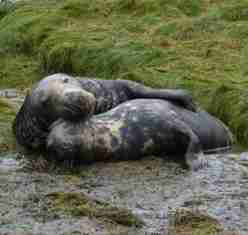Global warming improves sex life of seals
Global warming improves sex life of seals
mongabay.com
December 14, 2006
Climate change is enhancing the sex life of subordinate male grey seals on the remote Scottish Island of North Rona according to researchers at Durham University and the University of St Andrews.
Writing in the Royal Society’s Biology Letters, Dr Sean Twiss, a professor at the Biological and Biomedical Sciences at Durham University, said that higher temperatures and lower rainfall has altered the mating habits within the grey seal colony of North Rona. A statement from Durham University explains:
-
Warmer and drier autumns have led to a reduction in pools of rainwater which the female seals require to maintain their body temperature and provide them with a source of drinking water. As a result the females, who remain loyal to one breeding site, must travel further to access the vital resource for themselves and their pups, which removes them from the watchful eye of the dominant males and allows subordinate males to mate with them.
“Grey seals are typically polygamous, with the more dominant males mating with approximately ten to fifteen females which they guard from other males within their territory,” explained Dr. Twiss. “These males’ ability to dominate is easy when rainwater pools are abundant and females cluster in a small geographical area, but during dry seasons the area in which the females are located becomes too big and they can no longer successfully keep an eye on them all!”
 Photo by Dr. Twiss |
“The females must travel further to access water before returning to nurse their pups, which remain at the original pupping location. The increased movement amongst the females allows the weaker males to mate and results in more males contributing genetically to the next generation,” he added.
The researchers recorded a 61% increase in the number of males contributing to the genetic pool during their nine-year study.
“Much current research is focusing on the geographical movement of animals as a result of climate change. What we are interested in finding out is what impact climate change has on the behaviour of animals — how it effects their social systems including mating patterns,” Twiss said.
“The effect of climatic variation on temperature and rainfall has wide-spread implications for many species as there are very few animal populations whose mating patterns and levels of polygamy are not intimately linked to resource distribution. These findings show that climate change, whilst endangering many species could also help to increase the genetic diversity of some species, giving a leg up (or over!) to males who normally wouldn’t be so successful.”
This article is based on a news release from Durham University.